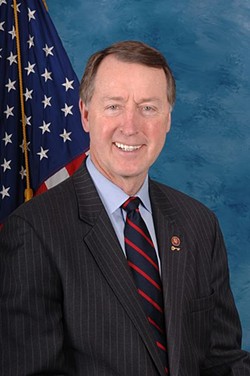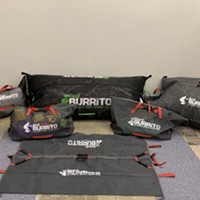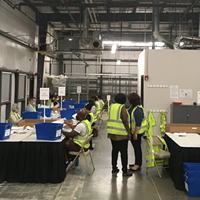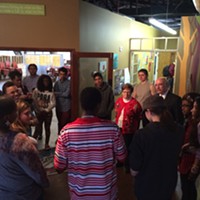This is the third and final installment of our series with the Democratic candidates running for governor of North Carolina. This time we go one-on-one with former Congressman Bob Etheridge.
Etheridge has been a county commissioner, state legislator, state superintendent of schools and was on Capitol Hill from 1998-2011. Most recently he has been head of the North Carolina Office of Economic Recovery and Investment, overseeing the remaining stimulus funds in the state.
According to recent polling, Etheridge has an early lead in the race over Lt. Governor Walter Dalton and state Rep. Bill Faison, due to name recognition. But questions linger about whether Etheridge has the resiliency to bounce back from his 2010 re-election defeat, or whether he has the time or the focus to put together a winning campaign.
In a way, it's actually a positive that Etheridge is not polished at this point. Voters should appreciate that. While the other two men in the race had been planning statewide campaigns for months, Etheridge was caught off guard by Gov. Beverly Perdue's announcement not to seek re-election.
When others potential candidates like Erskine Bowles and Heath Shuler opted not to run, Etheridge saw the opening for an experienced and battle hardened veteran.
Though still dogged by the infamous YouTube video from 2010, the real Etheridge is actually quite different — he's amiable with an old Southern charm about him.
If Etheridge can find his voice in the coming weeks, and hold his own in the debates, he could very well be the Democratic candidate facing Pat McCrory in the fall.
Creative Loafing: You had been out of public office for a year. What compelled you to return to the political arena?
Bob Etheridge: I really think North Carolina is at a crossroads. Everything in my life has really been about building from the ground up. It really started with public schools. The public-school system really empowered me as a poor kid from the farm. My parents were tenant farmers down in eastern North Carolina in Johnston County. A tenant farmer means you tend somebody else's farm and live in their house, and we lived in five different homes as I was growing up. That empowered me to learn and grow and really achieve beyond all reasonable expectations. Some might say that was the American Dream, but I really believe that dream is under assault today. You can't just fire teachers and cut the college curriculum, cap the enrollment and starve our community colleges, slash opportunities that allow young folks to have upward mobility or deny workers who are out of work the opportunity to be retrained. Unfortunately that is exactly what the Republican-controlled legislature has been doing over the last couple of years. That's why I'm running for governor.
To be the candidate, against the likely Republican Pat McCrory, you must first win the primary of your Democratic Party. What does the Democratic Party of North Carolina stand for in the 21st century, and what makes you best equipped to lead them at the top of the ticket?
Well, I think the things the party stands for today are some of the things the party has always stood for, including opportunity for everyone no matter you're ethnic or economic background. We've always stood for opportunity, whether it be education, people with special needs or someone starting a small business. The Democratic Party has always been there. It's been a party of opportunity, giving a helping hand. When our men and women came home from World War II, we had the G.I. Bill, which helped a lot of folks to make it. And when I was in Washington, I cosponsored legislation that created the 21st G.I. Bill, which kicked in in 2009. Now we have thousands of men and women who served in Afghanistan and Iraq who are now going back to college. They'll be a new wave of bright young people who will fuel this economy in the 21st century. That's our message, and I look forward to winning the primary and taking that on to Mr. McCrory in November.
This has been a short primary, not to mention that Dalton was already prepared for a statewide run, and Rep. Faison was looking at it from behind the scenes. What has it been like to field a campaign on such short notice, and what are some things you feel like you need to do to catch up?
It's sort of like drinking water from a fire hose. You just try to run as fast as you can, and do as much as you can. But if the polling data is accurate, I am leading in the polls statewide by double digits at this point. You have to assume those are accurate. But I think that has to do with a lifetime of working for people as a legislator in North Carolina. I chaired appropriations committee for four years working with people all across the state. As state superintendent for eight years, I worked with people across the state, and even in Congress I worked with people across the state on business and education and a host of other issues we dealt with in Washington.
You lost your congressional seat during the Republican landslide of 2010. Why did that landslide happen? And looking back, would you have done anything differently in that race?
Well in the case of our district, we only had 42 percent of the people who voted in 2008 come back in 2010. That's a quick recipe for political disaster when people don't vote. I think there was a bit of apathy on the part of some Democrats in our district. There was a tremendous amount of money spent by third-party organizations. They spent about a half-million dollars in our race in two weeks. And it was just an avalanche of money and mailers, with depressed Democratic turnout and excited Republican turnout. Even with that, we lost by just a handful of votes. It was a year where people were running a race against the president, and throughout history the first midterm during a presidency is always a difficult time. We faced the guillotine as did a lot of good people across America.
You voted for the recovery package and the healthcare bill, votes which likely contributed to your defeat, but you still defend those votes with pride. What are some other moments from your career on Capitol Hill that you are most proud of?
We did a number of things. Certainly the recovery package saved this country from one of the worst economic downturns in history. It kept teachers in the classroom, law enforcement and firemen in place, and created jobs. I got passed a school construction bill that put a total of a half-billion dollars to build and renovate schools and create 10,000 jobs across North Carolina. But also we had the Hometown Heroes Bill, which means that every sworn law enforcement officer, firemen and first responders receive a federal death benefit if they died of a heart attack or stroke within 24 hours of going off duty. The truth is nearly half of all firemen who lose their lives, lose them because of a heart attack or stroke. I was a primary sponsor of both bills.
We have a Republican-run legislature in North Carolina for the first time in a very long time, and because of redistricting they are likely to stay in power. What are the dangers of having a Republican governor to go along with that legislature? If elected, what would you do to work with them, and to stand up to them?
I would hope we add some numbers to our Democratic colleagues in the General Assembly. The redistricting is going to make it very difficult to take back control, but it's not impossible if people turn out and vote. But the way they've carved the districts up is unprecedented. Every party always draws lines to advantage themselves, but this is the first time a party has taken over and punished women; double-bunking by putting two female representatives in the same district so one would lose. Then they took on minorities in an unprecedented way. You work with them if you gain, or else you have to go across the state and drum up support for issues important to the state of North Carolina. Education is important, early childhood is important. Jobs and the economy are important. But I think folks will go to the polls in November, and there will be some changes because of the draconian things this last legislature has done. Most folks don't realize that over the last ten years we've seen fees and tuition at our public universities double. That's a recipe for long-term disaster.
CL: Amendment One, which you oppose, has become a huge issue on this primary ballot. A lot of folks say though, that its success or failure depends on whether conservative Democrats and African Americans support it. Being a leader of your party, and a potential governor of the state, what would you say to people who are unsure about whether they should oppose the amendment?
Etheridge: We already have a statute on the books that covers the issue it's concerned about. And we have never, to my knowledge, put in something in our state's constitution that takes away someone's rights. I think that's a very dangerous thing, and I hope the people of our state would not go down that road. As a party, as a state and as a country we are, and should be, about advancing the rights of everyone.
As a small-town guy from eastern North Carolina, how did you become a prominent legislator? What it's like running for governor of North Carolina, and what are the values and experiences you take with you as you campaign across the state?
I grew up with two parents, neither of whom finished high school. My dad actually worked in the CCCs, the Civilian Conservation Corps, to make money to send home to his family during the Depression. My mother lost her mother when she was 7 or 8-years-old, and her dad never remarried. So she dropped out of school at an early age. I was born in Sampson County and raised in Johnston, but I grew up going to school every single day. Never missed a day of school till I was in the eighth grade and had to go to the hospital for surgery. My parents understood the importance of a good public education and wanted to make sure their children got it. I was the first member of my family to graduate from high school, and then go on to college. I worked two years at a textile mill — we called them cotton mills back then — to earn enough money to pay for my first semester of tuition. I was a walk-on on the basketball court, earned a full scholarship, graduated, and then spent two years in the Army. I came home and got into business. I've had a lot of opportunities, and I feel like every job I've had or office I've held makes me feel obligated to give something back. I do it in my church, where I've taught Sunday school for over thirty years. I'm married to the same lady I met in college. I still remember the yellow dress she was wearing the first time I saw her cross the dining hall. She's still as pretty today as she was then. Those are the values you bring with you, and that has fueled me along. We have a lot to give back and a lot to be thankful for, and those opportunities should not be closed to others. Our grandparents went through a lot tougher times than we've had, but they were willing to take less and invest in the future. We need to take a lesson from that.
Michael A. Cooper Jr. is a student at the Charlotte School of Law and was a 2009 New Leaders Fellow at the Center for Progressive Leadership. He was born and raised in North Wilkesboro.
Speaking of...
Latest in News Feature
More by Mike Cooper
Calendar
-

Queen Charlotte Fair @ Route 29 Pavilion
-

NEW WINDOW GALLERY-Pat Rhea-ACRYLIC PAINTINGS-April 05-30 2024 VALDESE, NC 28690 @ New Window Gallery/Play It Again Records
- Through April 30, 12 p.m.
-

TheDiscountCodes
-

Wine & Paint @ Blackfinn Ameripub- Ballantyne
-

Face to Face Foundation Gala @ The Revelry North End
-
Five Common Reasons Why Small Businesses Fail
-
Homer's night on the town 41
If you drank a shot with the Knights mascot on Sept. 20, you were basically harboring a fugitive
-
6 Factors to Consider When Buying Kratom Online 5


















